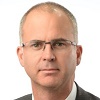 EMAIL
INTERVIEW
– Jason Cooper and Ken
Sinclair
EMAIL
INTERVIEW
– Jason Cooper and Ken
Sinclair
|
April 2017 |
[an error occurred while processing this directive] |
| |
 EMAIL
INTERVIEW
– Jason Cooper and Ken
Sinclair
EMAIL
INTERVIEW
– Jason Cooper and Ken
Sinclair
Jason Cooper, is Switch Automation’s
Vice President of Global Sales, where he’s responsible for accelerating
the expansion of Switch's real-time SaaS platform for the global smart
buildings market. Cooper brings more than 15 years of technical sales
management to Switch, with expertise in buildings, smart grids, energy
efficiency, health, data centres and resources.
Cooper joins Switch Automation with 14 years of experience at Siemens,
where he most recently served as Executive Manager of Sales, driving
sales in the Infrastructure & Cities sector. Cooper’s professional
experience, in addition to his familiarity with the industry challenges
and his knowledge of smart buildings, make him ideally suited to lead
Switch Automation’s growth. Having earned an electrical engineering
degree from RMIT in Australia, an Executive MBA from HEC Paris and an
Entrepreneurship & Innovation certificate from Babson College in
Boston, Cooper has consistently developed himself at some of the
world’s finest institutions.
| Articles |
| Interviews |
| Releases |
| New Products |
| Reviews |
| [an error occurred while processing this directive] |
| Editorial |
| Events |
| Sponsors |
| Site Search |
| Newsletters |
| [an error occurred while processing this directive] |
| Archives |
| Past Issues |
| Home |
| Editors |
| eDucation |
| [an error occurred while processing this directive] |
| Training |
| Links |
| Software |
| Subscribe |
| [an error occurred while processing this directive] |
Sinclair: You
spent 15 years at Siemens. What shift have you seen from the way that
people manage buildings from your early days with Siemens to now?
Originally, the way that people managed
buildings was very reactive, based on information from the BMS.
Decisions were made in isolation and with relatively limited
information. There wasn’t a strong focus on energy efficiency,
consumption or optimization.
Now there’s a greater focus on asset management and enhancing the tenant experience. Landlords realize that energy optimization boosts ROI and occupant satisfaction, while healthy energy ratings generate positive brand association; all of which attract higher paying tenants and drive retention.
We have technological solutions
available today to help us achieve these real estate goals.
Fortunately, innovative organizations are leading the migration from
reactive decision-making to proactive, predictive analysis, using
real-time data to pinpoint the performance of their portfolio. Then,
data scientists add a layer of value by advising customers about
cost-impacting trends in their buildings.
Buildings are broken. Technology can fix
them. But organizations must have the burning desire to change if
they’re truly going to capitalize on the benefits.
Sinclair: Why did you join Switch as VP of Global Sales?
I thoroughly enjoy the built industry
and the lasting global impact that it can have on future generations.
It’s why I’ve spent more than two decades pushing for evolution.
Switch’s unique cloud-based SaaS platform, and highly specialized team
represent an opportunity to solve a big problem for property owners and
operators.
Co-founders Deb Noller and John Darlington
devoted the last decade to creating a product that would fundamentally
disrupt the CRE industry. They wanted to provide a welcome reprieve
from the challenges that facility managers contend with every day. They
also cultivated a best-in-class engineering services team that lifts a
tremendous weight from users and ensures every customer sees results.
I’m joining the team at a time where we have the success stories, and
it’s time to tell them so we can help new customers replicate the wins.
Sinclair: What do you think is the most important consideration when evaluating a smart building platform and partner?
There are five factors that deserve thoughtful consideration before embarking on a smart building program:
[an error occurred while processing this directive]Sinclair: What patterns do enterprise organizations display that indicate to you that their smart building program will succeed?
Companies that optimize their building efficiency and productivity normally share three constants:
Sinclair: What keeps you up at night and what gets you up in the morning?
As a father, I feel my collective
generation has a responsibility to our children to be good stewards of
the environment. Urbanization across the globe necessitates forward
thinking about how we improve city infrastructure to protect our
children’s generation. This doesn’t mean making decisions purely for
“green” altruistic motives – it means making financially sensible
decisions that will also improve the way that we do business. When my
feet hit the floor in the morning, I’m motivated to find those answers.
[an error occurred while processing this directive]
[Click Banner To Learn More]
[Home Page] [The Automator] [About] [Subscribe ] [Contact Us]